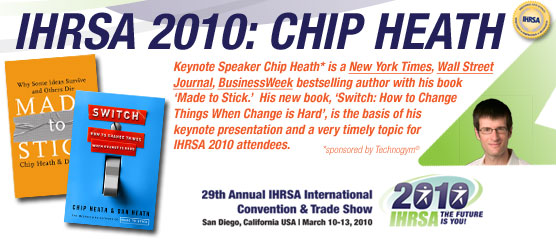How Will Change Happen In The Fitness And Wellness Industry ?
/ I write about change; the change that is coming as a result of mega trends in technology, globalism and demography and the need for the fitness and wellness industries to change to reach their promise. But how does change happen ? Made to Stick authors Chip and Dan Heath describe change in their latest book Switch: How To Change Things When Change Is Hard. They set out a framework for 3 ways change happens:
I write about change; the change that is coming as a result of mega trends in technology, globalism and demography and the need for the fitness and wellness industries to change to reach their promise. But how does change happen ? Made to Stick authors Chip and Dan Heath describe change in their latest book Switch: How To Change Things When Change Is Hard. They set out a framework for 3 ways change happens:
1. Direct the Rider (the conscious mind), eliminating what looks like resistance but is more often a lack of clarity by providing crystal-clear direction;
2. Motivate the Elephant (the subconscious), eliminating what looks like laziness but is more often exhaustion by engaging emotions to get people on the same path as you; and
3. Shape the Path (the situation), eliminating what looks like a people problem but is more often a situation problem, by making the environment more conducive to the change you seek.
So in watching the 60 minutes story last night about the Tunisian fruit vendor 26-yr.-old Mohammed Bouazizi, and how he set himself on fire out of frustration which resulted in a Facebook fueled revolution in the otherwise peaceful nation, I wondered about change. Obviously Bouazizi indirectly embraced all 3 of the frameworks, ending his life as a result. How tragic. Watch the story below and tell me, Bryan O'Rourke, what do you think about change ? Does it happen peacefully and slowly or more often is it started by a spark that fuels a sudden revolution ? What do you think needs to happen for fitness and wellness to become more of a part of our culture and ethos ? Who will be the catalysts ?
About the author:
Bryan O’Rourke is a health club industry expert, technologist, financier, and shareholder and executive in several fitness companies. He consults with global brands, serves as a member of the GGFA Think Tank is Chair of the Medical Fitness Association’s Education Committee, is President of the Fitness Industry Technology Council and a partner in Fitmarc, Integerus, Fitsomo and the Flywheel Group. To learn more contact Bryan here today .












